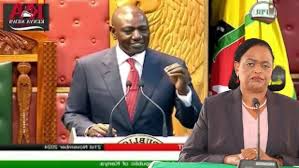President William Ruto and Chief Justice Martha Koome have been at odds over the judiciary’s role and its independence, with tensions escalating during a parliamentary session.
The President criticized the judiciary for alleged corruption, stating that impunity within the system cannot be tolerated, even as he pledged to uphold constitutional values.
This drew sharp responses from Justice Koome, who warned against undermining judicial authority and stressed that such actions risk setting a dangerous precedent for anarchy in the country.
During the same session, Ruto emphasized his administration’s commitment to combating corruption across all arms of government, including the judiciary.
This stance has sparked debate, with some viewing it as a necessary step to address systemic issues, while others, including opposition leaders, argue it undermines judicial independence and breaches constitutional boundaries.
Critics, such as Raila Odinga, have accused the President of attempting to intimidate the judiciary for political leverage.
The escalating tensions have prompted calls for dialogue between the judiciary and the executive to address mutual concerns.
However, these discussions have faced resistance from opposition figures, who warn that they might compromise the judiciary’s independence.
This clash highlights the broader struggle to maintain a balance between accountability and the separation of powers in Kenya’s governance framework.


